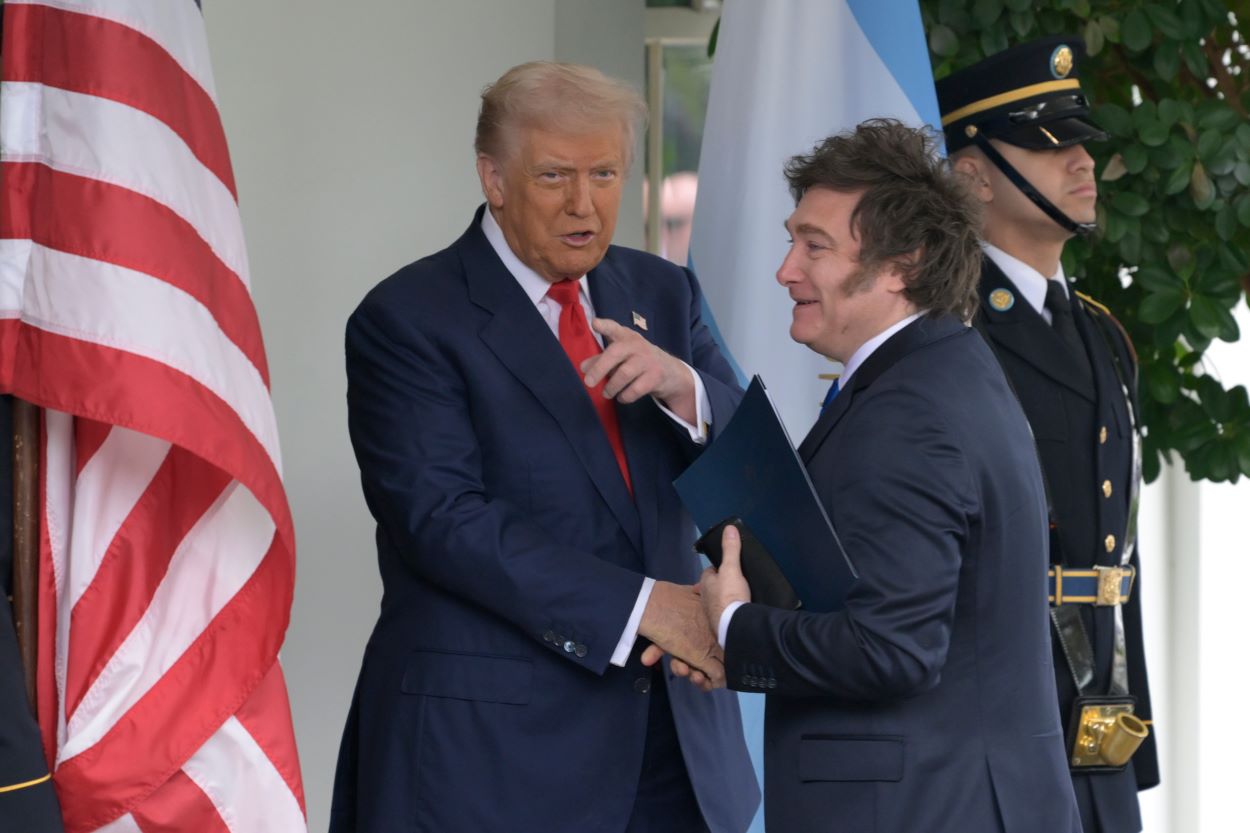Colombia's VP Francisco Santos on the U.S.-Colombia Pact
Colombia's VP Francisco Santos on the U.S.-Colombia Pact
In an exclusive AS/COA interview, Colombian Vice President Francisco Santos discusses how ratification of the U.S.-Colombia Trade Promotion Agreement will create jobs and further strengthen economic growth and security.
“The FTA will prove to the region how trade can go hand-in-hand with the fight against poverty, the fight against impunity, and the fight against drugs and related crimes.”
The TPA was formally transmitted to the U.S. Congress on April 8, 2008, and under existing rules, Congress has 90 legislative days to vote on passage. Vice President Santos will speak at the AS/COA in New York on April 17, 2008.
AS/COA: The U.S.-Colombia Trade Promotion Agreement awaits ratification by the U.S. Congress. How would a free-trade agreement with the U.S. help to further increase economic growth and security in Colombia?
Santos: Colombia’s economy is the fifth largest in South America, and under President Uribe, it has enjoyed five years of consistent economic growth. The macroeconomic policies implemented by the Uribe government have reduced unemployment and stimulated sustainable economic growth.
In 2006, the nation’s economy grew by 6.8 percent, among the highest rates in Latin America and five times Colombia’s economic growth rate in 2002. Colombia's international debt rating outlook was elevated in 2003 from negative to stable by Standard & Poor's and has maintained stable status.
President Uribe’s ambitious programs to increase exports, bolster internal investment, and tightly monitor government spending have paid dividends in an expanding economy. Colombia is now the fourth largest market for U.S. goods in South America and boasts a diverse range of flourishing industries including energy, manufacturing, telecommunications, transport, agro-business, and business and financial services. The TPA will help to provide long-term stability by enhancing sustainable economic growth and social development—in Colombia this is critical to building peace and strengthening democratic institutions.
The Colombia-U.S. TPA will prove to be the most effective alternative development program in Colombia, creating opportunities for Colombian peasants involved in illegal crop cultivation and illegal combatants who have demobilized and disarmed from paramilitary and guerilla groups. Models show the agreement could expand Colombia’s GDP by at least 1 percent and reduce its unemployment rate by 2 percent over the next four years.
AS/COA: Select members of Congress have voiced concern about the level of violence in Colombia, and, in fact, several congressmen have visited your country in the past year to more fully understand the current labor and human rights situation. What steps has Colombia taken to reduce violence, particularly those actions directed toward union leaders?
Santos: The main goal of the Democratic Security Policy is ensuring the free exercise of rights for everyone in Colombia. The experience shows positive results: a reduction in homicides from 28,837 in 2002 to 17,198 in 2007; a reduction in kidnappings from 2,882 to 521 cases in the same period; a reduction in displacement from 426,668 to 279,940 persons during the same five years; and finally, a reduction in labor union leader murders from 196 crimes in 2002 to 26 in 2007. We are not satisfied with these results. We know there is still a long way to go, but we are certain that we are on the right track.
The government has strengthened the judicial system to eliminate impunity, strengthened state control throughout Colombian territory, and fought criminal organizations in order to guarantee security for the population. The situation found by this government was one of weakness in regard to territorial control and strength of illegal armed groups. Now the situation is different: the state has near total control; criminal groups are either on the run, demobilized, in the hands of justice, or in the process of being weakened.
We have created special protection programs for labor union members, social organizations, victims, and witnesses. The budget for those programs has been increased from $4 million per year in 2002 to $43 million in 2008.
Finally, as a response to the violence against labor union members, we have created a special group of prosecutors with the goal of resolving all the cases. Their results are important: in 2007 convictions were handed down in 36 cases; in 2002 the Attorney General’s office was only successful in one such case. On this note, it is important to clarify that not all crimes against union leaders were committed because of their political activities.
AS/COA: To what extent is the Colombian government willing to work with the U.S. government in implementing the agreement to address any potential modifications requested by Congress?
Santos: The Colombian government has already shown its good will to work with the U.S. government in implementing the agreement. Last year, the U.S. Congress requested an amendment protocol be incorporated into the agreement, and the Colombian government quickly responded to that request. Approval was asked for from the Colombian Congress and the go-ahead was obtained in a very short time. As mentioned a year ago, we certainly trust that the changes included in the protocol are good enough to gain support for the agreement. We don´t foresee any additional requests for amendments to the TPA.
AS/COA: How would the agreement’s passage strengthen bilateral relations?
Santos: The people and the governments of Colombia and the Unites States share the same values of democracy. The TPA is an opportunity to strengthen bilateral relations between both countries, which are based on a comprehensive agenda ranging from cooperation in fighting the global drug problem to trade, tourism, and social issues. The TPA will give the opportunity for more jobs to be created and for good labor conditions in both countries. It will also prove to the region how trade can go hand-in-hand with the fight against poverty, the fight against impunity, and the fight against drugs and related crimes.
The TPA is an instrument for achieving regional prosperity. At a hemispheric level, it will send a positive message of cooperation and make a significant contribution to the security and prosperity of the Americas.
It is also a very useful tool for promoting the excellent relations between the two countries. After all, trade and investment appear to be the most effective means for combating poverty, inequality, and violence. (The agreement will) further strengthen Colombia’s positive economic momentum and counteract the corruptive influence of drug trafficking and the violence that it fuels.
- Due to tariff asymmetry, the primary effects of the TPA will be improved U.S. access to the Colombian market and an increase in U.S. exports to Colombia.
- New jobs and investment opportunities to assure economic growth and export diversification.
- Reliable legal framework to support commodities and services trade and bilateral investment.
- Improved security for foreign investors and a dispute settlement mechanism for American companies.
- Strengthened legal instrument that will further improve labor, environmental, and human rights conditions and transparency standards.
- Finally, the TPA also may increase trade and investment through trade facilitation. This includes the reduction of barriers to customs processing, an improved regulatory environment such as enhanced investor protections, and increased regulatory transparency.
- The primary impact of the U.S.-Colombia TPA will be increased U.S. exports to Colombia as a result of enhanced U.S. access to the Colombian market.
- The U.S. GDP will increase about $2.5 billion.
- Colombia is one of the biggest Latin American countries that import goods from the U.S.
- Colombia is the eleventh largest petroleum supplier to the United States, with wide opportunities for exploration and potential energy resources for the future.
- A contribution in attaining the goals of Colombian policies, particularly boosting the positive trends toward peace, stability, and the protection of human rights.
- The TPA will prove to be a more effective program of alternative development in Colombia. It will create new opportunities for Colombian peasants involved in illicit crop cultivation, demobilized illegal combatants, and unarmed members of guerrilla and paramilitary groups.
- It will help the Colombian economy to become more competitive in regional and global markets and comply with international labor, environmental, and intellectual property rights standards.
- The TPA will contribute about 1 percent to Colombia’s GDP and reduce unemployment rates by about 2 percent over the next four years.
AS/COA: Looking beyond the pending TPA, the recent diplomatic spat between Colombia, Ecuador and Venezuela could be seen as a turning point in the way countries work together to address regional security and drug trafficking. Moving forward, how does Colombia envision working even more constructively with its neighbors on these issues?
Santos: The fight against the world’s illicit drug problem, terrorism, and transnational organized crime is a key component of Colombia’s foreign policy. Besides its commitment to fulfill multilateral and bilateral obligations on these fronts, Colombia promotes the effective cooperation between countries to jointly fight against these crimes.
Latin America and the Caribbean is the natural geographical region for Colombia. Therefore, they are the foremost priority in our foreign policy. That is why we have always prioritized relations with our neighbors to confront all forms of international organized crime, including drug trafficking and terrorism. We have ongoing bilateral, regional, and hemispheric efforts that allow us to communicate swiftly and effectively with all levels of the region’s different governments. In the following months, we will be participating in several cooperation mechanisms such as a regional security and drugs Presidential Summit in July 2008, the Three-Border meeting with Brazil and Peru, and the OAS Inter-American Drug Abuse Control Commission meeting (with Colombia as Chairman), among others. Also, we participate in permanent dialogue mechanisms related to organized crime such as OAS Inter-American Committee Against Terrorism. This is a common and effective tool for exchanging information and expert training in important fields such as counter-terrorism, human trafficking, and cyber crimes, among others.








